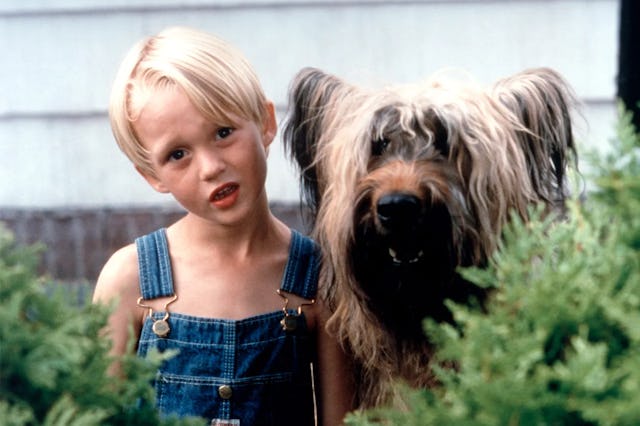30 Years Later, The ‘90s Classic Dennis The Menace Feels More Heartbreaking Than Hilarious
Now that I know about ADHD, this childhood classic just hits different.

Since Dennis the Menace was published in 1951, the kid at the center of the comic has been one of America's favorite troublemakers. I remember watching the 1993 John Hughes production of Dennis the Menace and laughing as he caused problems, made messes, and broke rules. But recently, I decided to rewatch the movie as an adult, and now my heart breaks for Dennis.
For context, in the time since I first came across Dennis, I've built relationships with kids who have ADHD. Children with ADHD have deficits in the brain areas that control self-regulation, and watching the 90's movie, you can see this hallmark trait in every mistake that Dennis makes.
In fact, according to a Psychology Today article, Dennis is "the poster child for ADHD."
The most memorable scene happens right at the beginning when Dennis visits Mr. Wilson. Even though Dennis thinks of him as a best friend, Mr. Wilson dreads these visits and pretends to be sick in bed. Dennis decides to give him an aspirin, but he doesn't want to get his fingers caught in Mr. Wilson's snoring mouth, so he uses a slingshot to shoot it in. Of course, Dennis gets chased out of the house.
Thanks to good ol' ADHD, Dennis constantly struggles to think before acting, fails to consider consequences, and doesn't learn well from his past mistakes. During the aspirin stunt, Dennis wants to help his friend and can't slow down to consider the best path. Literally, all that exists in his brain is the aspirin, the slingshot, and his sick friend's mouth.
Kids with ADHD may be well-intentioned, but sadly, some people only see "menaces." When Dennis' parents need to leave on business, they call every babysitter in town, and the sitters are shown laughing, hanging up, or adamantly refusing. One sitter has a broken arm, and the implication is that Dennis caused it. Eventually, Mrs. Wilson agrees to babysit because she always wanted to have a child of her own.
Leaving kids with a babysitter is incredibly stressful for any parent, but it's worse for Dennis' parents because kids with ADHD are more likely to end up injured or in a dangerous situation. That's exactly what happens when Mr. Wilson rages at Dennis for destroying his fancy party. Kids with ADHD can't plan, solve problems, or manage their emotions as easily as neurotypical kids, so Dennis responds by running away.
At this point, we have a 5-year-old kid running away from home at night in a movie by John Hughes, aka genius creator of Home Alone. So, of course, Dennis runs straight into the hands of a criminal, and Home-Alone-level pranks and hijinks ensue.
With Dennis gone, everything feels empty, causing Mr. Wilson to realize that he actually appreciates Dennis. This revelation feels true to life because kids with ADHD can be super kind-hearted, and they often triumph in unexpected ways — like when Dennis returns with the criminal tied up and utterly defeated.
Mr. Wilson worries that people will think he's "the bad guy" for not tolerating Dennis' bad behavior. "I'm the victim!" he insists. Here's the thing: Mr. Wilson isn't wrong.
He is the victim, as is everyone in this movie, including Dennis. ADHD was not recognized at the time, so the "menace" behavior was met with anger. Everyone in the film was a victim of the era they lived in. I wish I could say that everything is better now, but modern kids with ADHD still struggle to succeed. Brain imaging and research have shown that ADHD is a neurobiological disability, but some people still think it's not a real medical condition.
At the end of the movie, Mr. Wilson is determined to turn over a new leaf, so he proclaims that he will "roll with the punches." Right as he says this, Dennis accidentally flips a flaming marshmallow onto Wilson's forehead.
And let's be honest, that's the nature of parenting, regardless of whether your kid has ADHD or not. Just when you think you have it all figured out, a flaming marshmallow smacks you in the face. At least the movie gives us a chance to laugh about those moments. It reminds us that we are not alone, and that together we can bring out the best in every child.